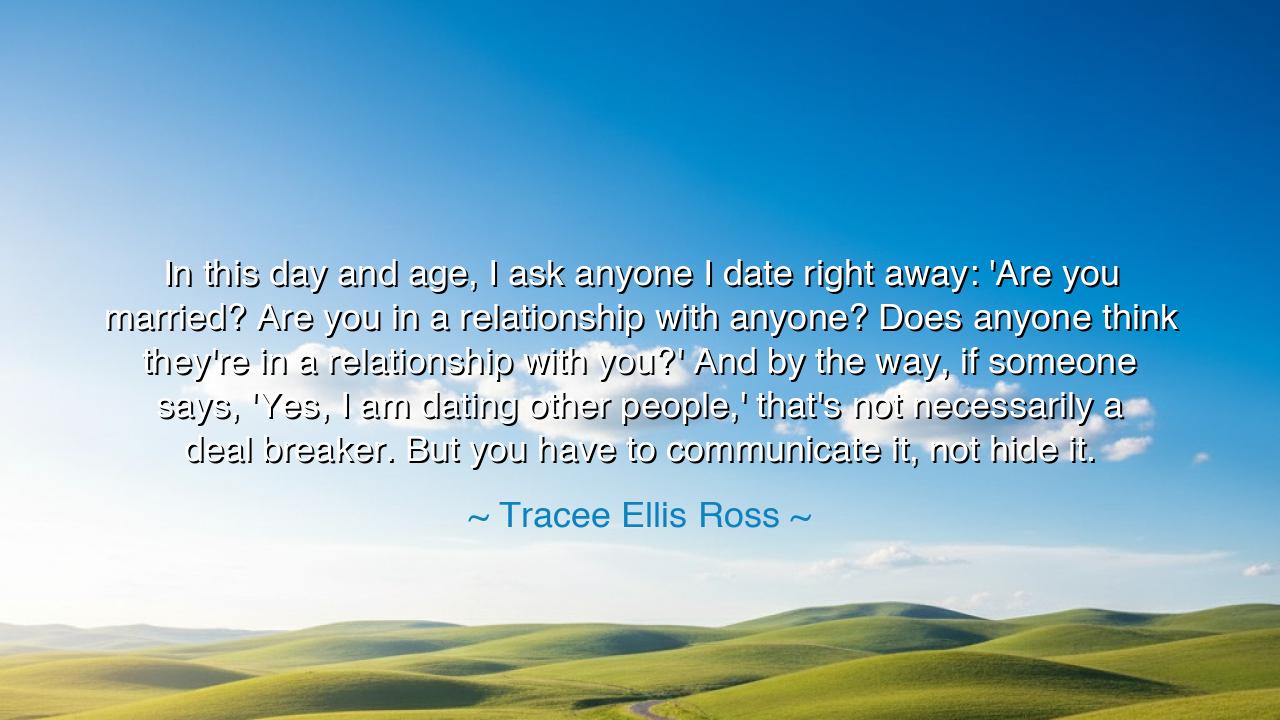
In this day and age, I ask anyone I date right away: 'Are you
In this day and age, I ask anyone I date right away: 'Are you married? Are you in a relationship with anyone? Does anyone think they're in a relationship with you?' And by the way, if someone says, 'Yes, I am dating other people,' that's not necessarily a deal breaker. But you have to communicate it, not hide it.






When Tracee Ellis Ross said, “In this day and age, I ask anyone I date right away: ‘Are you married? Are you in a relationship with anyone? Does anyone think they’re in a relationship with you?’ And by the way, if someone says, ‘Yes, I am dating other people,’ that’s not necessarily a deal breaker. But you have to communicate it, not hide it,” she spoke not only of romance, but of the ancient virtue of truth. Beneath her words lies the eternal wisdom that honesty is the foundation upon which all human connection must stand. In her voice, we hear the echo of generations who have learned — sometimes through heartbreak — that love cannot grow in the shadows.
The origin of this reflection arises from Tracee’s own experience navigating modern relationships in a world clouded by half-truths, digital illusions, and unspoken assumptions. The times have changed, but the human heart has not. In an age of constant communication, people have grown paradoxically distant — connected by devices, yet divided by fear. Thus, Ross’s question — direct, bold, and fearless — becomes a moral act. It is the reclaiming of clarity in a culture of confusion, the insistence that truth, however uncomfortable, is more sacred than pretense.
To the ancients, this insistence on truth was a form of spiritual discipline. The philosopher Plato taught that love (eros) could only flourish in the presence of truth (aletheia). To deceive one’s partner, or even oneself, was to blind the soul to its higher calling. Similarly, in the teachings of the Stoics, honesty was not simply politeness — it was an act of courage. To ask, as Tracee does, “Does anyone think they’re in a relationship with you?” is to pierce the veil of self-deception. It is the same wisdom that guided Diogenes, who carried a lantern through the streets of Athens, saying he was searching for an honest man. In love, as in life, the search for honesty is the search for peace.
Her words also reveal an understanding of the balance between freedom and integrity. She does not condemn those who are dating others; she condemns only the hiding of it. For love, to be pure, must be rooted in consent and communication. The ancients would have called this the harmony of virtue — sophrosyne — the discipline of the soul that allows desire to coexist with respect. When she says that openness is not a “deal breaker,” she shows a rare strength of spirit: the ability to love without possession, to desire without deceit. Such maturity transforms the battlefield of romance into a sanctuary of mutual honor.
Consider the story of Odysseus and Penelope, two lovers separated by years and temptation. Though surrounded by false suitors and uncertain fates, Penelope’s loyalty endured because it was anchored in truth. Likewise, Odysseus, despite his long wanderings, longed not for conquest but for the honesty of home. Their story, like Tracee’s wisdom, reminds us that relationships survive not through perfection, but through truth — the steadfast light that endures storms and time. Lies, by contrast, are like shifting sand: no structure can stand upon them for long.
There is also in Tracee’s reflection a call to self-respect. To ask clear questions at the start of a relationship is not distrust — it is self-care. The ancients would say it is the mark of one who knows their worth. As the Oracle of Delphi once advised, “Know thyself.” In knowing herself, Tracee refuses to trade peace for illusion. Her boundaries are not walls; they are gates — welcoming honesty and closing against deceit. This is not cynicism; it is wisdom born of experience, the kind that teaches that love is not built upon mystery, but upon mutual recognition.
The lesson here is as timeless as it is urgent: speak truthfully, and demand truth in return. In every bond — romantic, familial, or friendship — clarity is kindness. Hidden intentions corrode what honesty could have preserved. Let your words be light, and your actions transparent, for deception, however small, darkens both the deceiver and the deceived. In a world that rewards appearance over authenticity, courage lies in being clear.
Thus, Tracee Ellis Ross’s words are not merely advice for dating — they are a manifesto for the soul. They teach that love without truth is illusion, and freedom without honesty is chaos. To love well, one must first live truthfully. So, let each person who seeks connection begin as she does: with courage, with clarity, and with the sacred question — not “Do you love me?” but “Will you be real with me?” For only where truth dwells can love truly endure.






AAdministratorAdministrator
Welcome, honored guests. Please leave a comment, we will respond soon